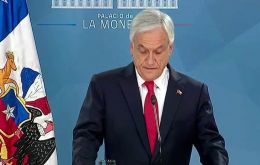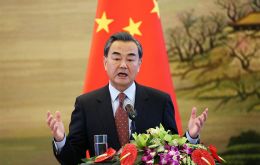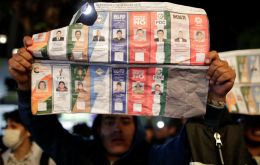MercoPress. South Atlantic News Agency
Stories for October 23rd 2019
-
Wednesday, October 23rd 2019 - 21:54 UTC
Uruguay Sunday’s general election: To a second ballotage and without parliamentary majority

On Sunday, October 27, in Uruguay, a new president, and Parliament will be elected. According to pollsters, the same parties as in 2014, the official Frente Amplio (FA, Broad Front) and the conservative National Party, will go on second ballotage in November. However, the novelty is that the Legislature will be made up of a minimum of six parties (a historical record) and a maximum of nine.
-
Wednesday, October 23rd 2019 - 09:58 UTC
Piñera asks for forgiveness and announces a social agenda to resolve inequality accumulated for decades

Chile’s President Sebastian Piñera announced an ambitious raft of measures on Tuesday, aiming to quell protests against his government with a guaranteed minimum wage, a hike in the state pension offering and the stabilization of electricity costs.
-
Wednesday, October 23rd 2019 - 09:55 UTC
Brazil approves pensions' reform: markets soar and stocks hit an all time high

Brazil's Senate on Tuesday gave final approval to a landmark reform of the country's social security system, in a step seen as key to stabilizing public finances and the economy. The text was approved by a vote of 60-19.
-
Wednesday, October 23rd 2019 - 09:51 UTC
Rioting in Bolivia to protest Electoral Tribunal “manipulations” which favor a first round win for Evo Morales

Arson attacks, rioting, looting on Tuesday has extended to several Bolivian cities to protest the results of the country's presidential election process on Sunday, particularly since an oddly delayed official quick count showed President Evo Morales near an outright first-round victory — even as a more formal tally tended to show him heading for a risky runoff.
-
Wednesday, October 23rd 2019 - 09:50 UTC
China attacks Western hypocrisy equaling Hong Kong with Chile and Catalonia situations

China is seizing on violent protests in Europe and South America to bolster its condemnation of demonstrations in Hong Kong and defend its handling of the unrest.
-
Wednesday, October 23rd 2019 - 09:50 UTC
Bolivian president agrees with OAS a full recount of Sunday's presidential votes

Secretary-General of the Organization of American States (OAS) Luis Almagro has accepted the Bolivian government’s invitation to carry out an audit of the recent presidential election in the country, amid controversies over the results.
-
Wednesday, October 23rd 2019 - 09:48 UTC
Conservative Catholics disrupt Vatican Amazon synod and dump in the Tiber “pagan” idols

The Vatican on Tuesday accused ultra-conservative Catholic social media of fomenting hate, a day after militants stole statues they considered pagan idols from a church and dumped them in the Tiber river.
-
Wednesday, October 23rd 2019 - 09:47 UTC
Mexican elite forces sent to Culiacan where El Chapo's son cartel forced the army to retreat

Mexico sent in special forces troops to patrol a northern city in the wake of a cartel assault that freed Joaquin “El Chapo” Guzman’s son in a hail of bullets and also won a U.S. promise to help stop gun-smuggling at their shared border.
-
Wednesday, October 23rd 2019 - 09:45 UTC
Brazil has collected 600 tons of oil from the spill along northeastern beaches

Brazil has collected more 600 tons of oil from its northeastern beaches since Sept. 12, the government said, more than double an estimate of oil and sand collected by state-run oil company Petrobras.
-
Wednesday, October 23rd 2019 - 09:40 UTC
German farmers protest new agricultural policy which promotes organic practices

Thousands of farmers drove their tractors into German cities on Tuesday, in protest at the government's new agricultural policies which they say will hurt their livelihoods and make them scapegoats for climate change.
